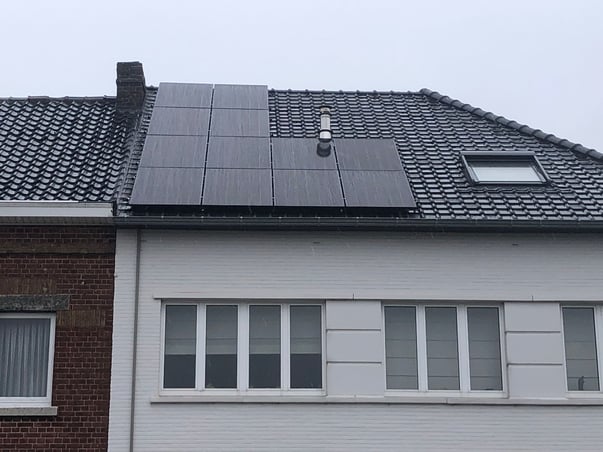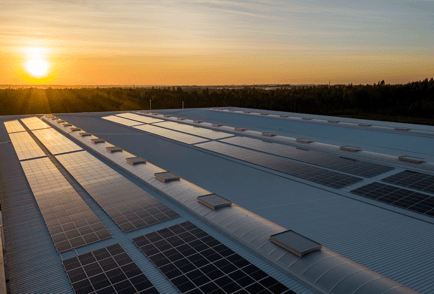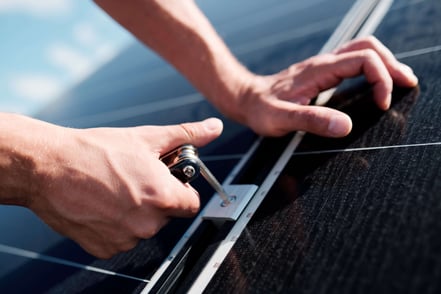Introduction

Opting for solar energy not only benefits the environment, but it can also generate significant savings on your electricity bills. Choosing the right solar panel for your home is a crucial decision, as it directly impacts the performance and efficiency of your solar energy system. In this article, we will provide you with a brief overview of factors to consider when selecting the perfect solar panel for your needs.
Understanding the types of solar panels
First of aal, you need to be aware that there's a difference between photovoltaic solar panels and solar thermal systems. The first one converts sunlight directly into electricity using photovoltaic cells. Solar thermal systems, on the other hand, use sunlight to heat fluid like water often used for domestic hot water. we will only discuss photovoltaic solar panels.
There are three main types of solar panels available in the market: monocrystalline, polycrystalline, and thin-film.
Monocrystalline solar panels
Monocrystalline solar panels are made from a single crystal structure, resulting in a high level of efficiency. This high output per square meter makes them a popular choice for homeowners with limited roof space.
Polycrystalline solar panels
Polycrystalline solar panels consist of multiple crystal structures, leading to a slightly lower efficiency rate compared to monocrystalline panels. Whereas these type of panels used to be popular for homeowners some years ago, monocrystalline panels have taken over and polycrystalline panels are now mainly used for large projects where space is not a limitation.
Thin-Film solar panels
Thin-film solar panels have a lower efficiency rate than monocrystalline and polycrystalline panels, but they are the most cost-effective option. They are also lightweight and flexible, making them suitable for various applications , but difficult to install. Due to that and their lower efficiency, they require more space and are not the best option for residential homes. Solar roof tiles often make use of this technology but are fairly new and costly. They cannot be installed on an existing roof and not every roof is suited for them.
Monocrystalline solar panels are a smart choice for your home: they are the most efficient, affordable and easiest to install. But how to pick from the enormous amount of mono solar panels out there? An easy way to start is to make a choice based on the design.
A solar panel is a solar panel? Not quite. Did you ever notice in the streets those ugly solar panels with silver frames, white backgrounds and grey lines?
A second, easy to recognize difference is the back cover of the solar panel. There are two types: Glass-Glass and Glass-Foil.
Finally, when choosing a type of solar panel, look at the solar cell technology used. Every technology has its own set of advantages, making it essential to understand their differences to determine the best fit for your situation.
Solar panel efficiency is a crucial factor in determining the performance of a solar panel but it is not the only thing to keep in mind. In this section, we will discuss the concept of solar panel efficiency, its importance and factors affecting it.
Definition of solar panel efficiency
Solar panel efficiency refers to the ratio of sunlight that the panel can convert into usable electricity. In other words, it indicates how effectively a solar panel can convert sunlight into power. Solar panel efficiency is typically expressed as a percentage, with higher percentages indicating better performance and energy production.
Importance of high-efficiency solar panels
High-efficiency solar panels can generate more electricity from the same amount of sunlight, making them a more effective solution for meeting your home's energy needs. Additionally, high-efficiency panels require less space on your roof, making them an ideal choice for homeowners with limited roof space or who wish to maximize the energy production from their solar panel installation.
Factors affecting solar panel efficiency
The efficiency percentage is based on tests in the most optimal conditions and should therefore not be your only determining factor. In reality, there are several factors that can impact a solar panel's efficiency and that are mostly dependent on the solar cells used. For example: some cell technologies are better at absorbing low light during evenings and mornings or lose only a minimum of performance when temperatures rise or time goes by.
Analyzing your electricity consumption
Choosing the right solar panel system for your home requires an understanding of your energy needs. To determine your energy needs, start by reviewing your electricity bills from the past year. Look for patterns in your energy usage, such as seasonal fluctuations or trends in monthly consumption. It is essential to have a clear understanding of your average monthly electricity usage, as this will help you select a solar panel system capable of meeting your energy demands.
Considering your location and available sunlight
The amount of sunlight your property receives is another critical factor in determining your solar panel system's size. Factors such as your geographical location, the direction your roof faces, and any shading from trees or buildings can impact the amount of sunlight your solar panels will receive. Ideally, your solar panels should be installed on a south-facing roof with minimal shading to maximize sunlight exposure and energy production. However, nowadays solar panels are a smart investment even if these requirements are not met.
Estimating the size of the solar panel system needed
Once you have a clear understanding of your electricity consumption and available sunlight, you can estimate the size of the solar panel system needed to meet your energy needs. Our certified installers can help you determine the optimal system size and type of solar panels based on your unique requirements.
Calculating solar panel costs for your home
When considering solar panels for your home, it's essential to factor in the various costs associated with the installation of your system. In this section, we'll discuss the factors that affect the cost of solar panels, compare the price of different solar panel systems, and explore the role of installation costs. Finally, we'll touch on financing options available for solar panels.
Factors affecting the cost of solar panels
The cost of solar panels can be influenced by several factors, including the type of solar panel, the size of the system, the efficiency of the panels, and the brand or manufacturer. Higher efficiency panels typically come with a higher price tag.
Comparing the price of different solar panel systems
When selecting a solar panel system for your home, it's essential to compare the price of different systems to ensure you're getting the best value for your investment. This involves comparing the cost per watt, the efficiency of the panels, and any additional features or services offered by the manufacturer or installer. Keep in mind that the cheapest option may not always be the best choice, as factors like efficiency and durability can have a significant impact on the long-term performance and savings of your solar energy system.
Financing options for solar panels
There are various financing options available for homeowners looking to invest in solar panels. These include solar loans, leases, and power purchase agreements (PPAs). Solar loans allow you to borrow money to purchase and install your solar panel system, while leases and PPAs involve a third party owning and maintaining the system while you pay for the energy produced. It's essential to carefully evaluate the terms and conditions of each financing option to determine the best fit for your financial situation and long-term solar energy goals.
Quality and durability of solar panels
Investing in a solar energy system is a long-term commitment, making the quality and durability of solar panels crucial factors to consider when choosing the right option for your home. High-quality, durable solar panels not only ensure efficient energy production but also reduce the need for frequent maintenance or replacement.
Importance of solar panel quality and durability
High-quality solar panels are more likely to perform optimally, providing you with a higher return on your investment. Additionally, durable solar panels can withstand various weather conditions and maintain their efficiency better over time, translating to long-lasting energy savings.
Factors to consider when assessing quality and durability
When evaluating the quality and durability of solar panels, consider factors such as the materials used, the manufacturing process, the warranty offered, and the reputation of the brand or manufacturer. Additionally, certifications and independent testing results can also provide valuable insights into the quality and reliability of solar panels. Belinus offers a 35-year all-in-one warranty on their products, demonstrating their commitment to quality and durability and giving you peace of mind in your investment.
Solar panel installation
Installing solar panels on your home requires careful planning and execution to ensure optimal performance and energy production. In this section, we will discuss the process of choosing the right location for solar panels on your roof, the factors affecting solar panel installation, and the importance of hiring professional installers.
When selecting the ideal location for your solar panels, consider factors such as the direction your roof faces, the angle of the panels, and any potential shading from trees or nearby structures. Ideally, solar panels should be installed on a south-facing roof to maximize sunlight exposure and energy production. Additionally, the angle of the panels plays a critical role in their efficiency, with the optimal tilt depending on your geographical location and the time of year.
Several factors can impact the solar panel installation process, including the size and complexity of your system, the condition of your roof, and any local regulations or permitting requirements. Navigating these factors can be challenging, making it crucial to work with a professional installer who can help you avoid potential pitfalls and ensure a seamless installation process.
Hiring professional installers is essential for the safe and efficient operation of your solar panel system. Professionals have the necessary skills, experience, and equipment to correctly install the panels, taking into account factors such as roof materials, load-bearing capacity, and electrical connections. They can also guide you through any permitting processes and provide you with valuable advice on maintaining and operating your solar energy system. That is why Belinus works with certified installers who are selected for their craftsmanship, service level and product knowledge.
In conclusion, proper solar panel installation is a critical aspect of ensuring the success of your solar energy investment. By carefully selecting the location of your panels, understanding the factors affecting installation, and working with experienced professionals, you can enjoy the many benefits of solar energy for years to come.
Solar panel certifications and reviews
When choosing the right solar panel for your home, it's essential to consider certifications and reviews. Certifications attest to the quality and performance of solar panels, while customer reviews provide valuable insights into the experiences of other homeowners. In this section, we will explore the importance of solar panel certifications, discuss some common certifications, and explain how to read and compare customer reviews.
Importance of solar panel certifications
Certifications are crucial in ensuring the quality, safety, and performance of solar panels. They are awarded by independent organizations and testing bodies, confirming that the panels meet certain industry standards and requirements. Investing in certified solar panels can give you peace of mind, knowing that your chosen panels have been thoroughly tested and evaluated for their efficiency, durability, and overall performance.
Common certifications for solar panels
Some common certifications for solar panels include the International Electrotechnical Commission (IEC) certifications, such as IEC 61215 and IEC 61730, which assess the performance, safety, and durability of solar panels. Additionally, the Underwriters Laboratories (UL) certification, specifically UL 1703, ensures the safety and performance of solar panels for use in residential and commercial applications. When selecting solar panels, it's important to look for these certifications to guarantee that the panels meet industry standards.
Reading and comparing customer reviews
Customer reviews can provide valuable insights into the experiences of other homeowners who have installed solar panels. By reading and comparing reviews, you can identify patterns and trends in performance, efficiency, and customer satisfaction. Keep in mind that while negative reviews can highlight potential issues or concerns, it's essential to consider the overall consensus and not focus solely on isolated incidents. A solar panel with predominantly positive reviews and a few negative ones may still be a reliable and efficient choice for your home.
In conclusion, considering solar panel certifications and reviews is an essential step in choosing the right solar panel for your home. By ensuring that your chosen panels have the necessary certifications and paying attention to customer experiences, you can make an informed decision and invest in a solar energy system that meets your needs and expectations.
Embrace solar power today
This guide has explored various factors to consider when choosing the right solar panel for your home, including types of solar panels, energy needs, efficiency, costs, quality, durability, installation, certifications, and seeking professional guidance. Armed with this knowledge, you're well-equipped to make an informed decision and invest in a solar energy system that meets your needs and expectations.
Belinus offers high-quality solar panels, incorporating the latest technologies and providing a 35-year all-in-one warranty. Discover why Belinus is the right choice for your solar energy needs by exploring their products and learning about their advanced technologies. Contact Belinus today to get started on your solar power journey!




